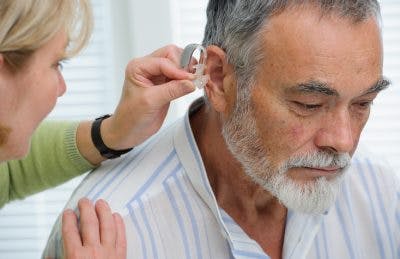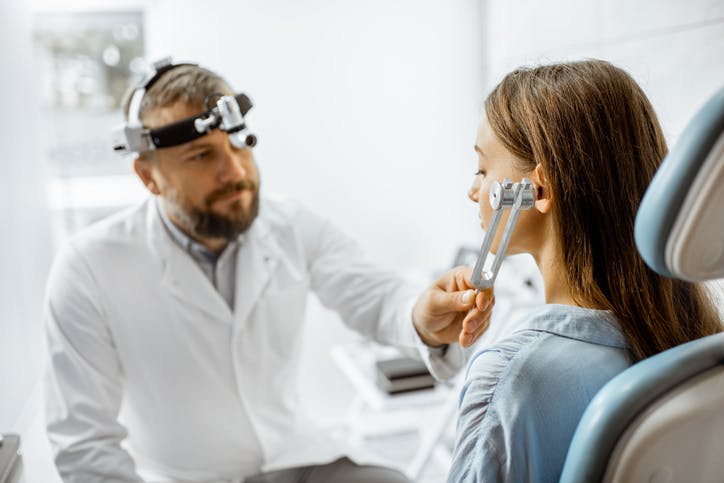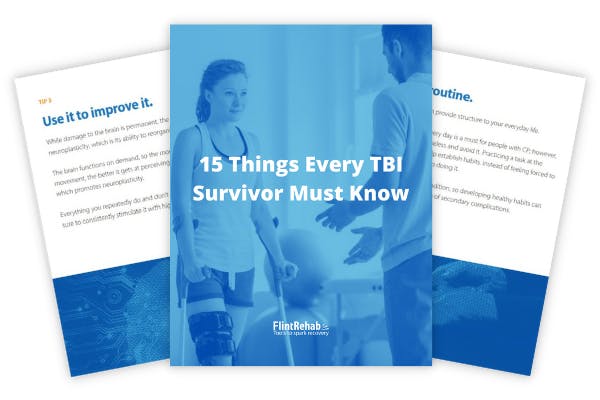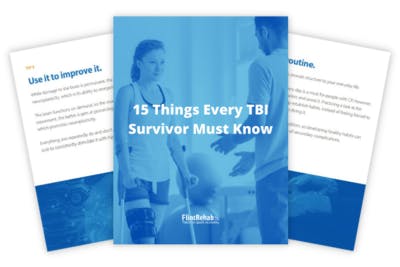No products in the cart.
No products in the cart.
No products in the cart.
No products in the cart.
Home » Neurological Recovery Blog » Traumatic Brain Injury » Hearing Loss After Head Injury: Causes, Diagnosis, and Treatments
Last updated on March 24, 2022

Hearing loss after a head injury can occur after damage to certain parts of the brain, particularly the temporal or parietal lobes. It can also be a result of problems with the ear’s mechanisms itself.
To help you navigate the various hearing problems that can occur after brain injury, this article will cover everything from diagnosing hearing loss to treating it.
Use the following links to jump to a relevant section:
There are two primary ways that hearing problems can arise after a head injury or concussion: neurological damage or mechanical damage.
For example, if an injury affects the mechanical process of hearing, the ear will not transmit sound to the brain at all. This is the most common cause of hearing loss after head injury.
On the other hand, if the parts of the brain that process hearing become damaged or disrupted, the brain can no longer process sound. Therefore, even if the ear itself functions properly, a patient can still experience hearing problems.
To understand how hearing loss can occur after a head injury, it will help to understand how the ear works.
The ear comprises three sections: the outer ear, the middle ear, and the inner ear. Each section plays a part in the hearing process:
Finally, the cochlea sends electrical impulses to the auditory nerve, which transmits those signals to the brain. If a head injury interrupts any part of this process, hearing loss can result.
For example, the blow from the injury can rupture the eardrum, dislocate the ossicle bones, or sever the auditory nerve. All of this can lead to hearing problems after head injury.

There are many types of hearing loss that can occur after a head injury, depending on which part of the ear or brain was damaged. We shall discuss each type in more detail in the sections below:
This type of hearing loss can occur when sound cannot transmit to the inner ear. Conductive hearing loss typically occurs after the ossicular chain is either damaged or dislodged. When this happens, sound can no longer travel through the bones to the cochlea.
Another, less common cause of conductive hearing loss is otosclerosis, which occurs when the three small bones in the ossicular chain fuse until they are so stiff that they can no longer vibrate. This once again makes it difficult for sound waves to travel.
For reasons researchers still don’t fully understand, brain injury can trigger abnormal bone growth throughout the body, including in the ear. Doctors call this heterotopic ossification. Therefore, if bone growth occurs inside the ear it can lead to hearing loss.
Finally, if the head injury occurred directly over the ear, the force of the impact could tear the tympanic membrane, which can cause blood to accumulate in the middle ear, a condition known as hemotympanum. This collection of blood will also cause conduction problems.
This occurs when an injury damages the structures of the inner ear. Blast-induced TBIs and airbag injuries are the most common causes of this type of hearing loss.
What separates labyrinthine concussions from other types of hearing loss is that this one occurs even if there are no visible bone fractures. Instead, the extreme force of the injury itself nearly destroys the cochlea.
Labyrinthine concussions can also trigger tinnitus (i.e. persistent ringing in the ears). Dizziness is another possible symptom.
Also known as hydrops. This disorder is caused by excess pressure in the inner ear chambers that contain fluid.
The pressure causes the fluid to shift, which can impair your hearing and your balance. It’s thought to occur as a result of bleeding in the inner ear.
There is no cure for Meniere’s syndrome. However, steroids and other medications can ease symptoms.

This is the most common type of hearing loss after head injury. It occurs when there is damage to either the hair-like cells in the inner ear that transfer sound or to the auditory nerve itself. While it is difficult to damage the auditory nerve, a temporal bone fracture can sometimes sever it.
This condition rarely causes complete hearing loss. It mainly affects the loudness or clarity of certain sounds.
It can also make a person more sensitive to sound, which may seem strange at first. Noises will seem so loud that it actually causes pain.
Auditory verbal agnosia is not technically a “hearing disorder.” However, it’s worth mentioning because it’s sometimes referred to as “pure word deafness.” This condition is caused by damage to the regions of the brain that process language.
Auditory verbal agnosia is similar to aphasia, in which the person loses the ability to understand spoken words. However with aphasia, the individual typically has trouble with reading and writing as well.
Contrastingly, with verbal agnosia, reading and writing typically remain intact, but these patients may describe hearing spoken language as meaningless noise. However, they typically still retain their ability to recognize other sounds.
Again, this condition is not a hearing disorder. Instead, it’s a language disorder that is best diagnosed and treated by a Speech-Language Pathologist.
Finally, hearing loss can occur after direct damage to the parts of the brain that process sound, such as the temporal lobe. This type is known as central hearing loss.
It can also develop after damage to hearing pathways that reside in the brain stem. Because the brain stem is responsible for receiving and transferring signals, including sound, to the rest of the brain, damage to the brain stem can disrupt this process and thus lead to hearing loss.
However, this type of hearing loss is exceedingly rare after a head injury, because these hearing pathways are bilateral. In other words, the pathways are present on both sides of the brain and brain stem. To cause lasting damage, an injury must take out both sides of the hearing circuitry, which is difficult to do.
Therefore, central hearing loss is typically not the culprit after a person’s head injury, and doctors usually only diagnose it when all other causes have been eliminated. It is, however, more common after brain damage caused by radiation to eliminate cancer, known as radiation necrosis.

The best way to treat hearing loss after head injury is to first determine what type of hearing loss you have. To do this, you should make an appointment with a hearing specialist known as an audiologist.
There are several ways an audiologist might diagnose your hearing loss, including:
Once your doctor determines which type of hearing loss you have incurred, you can get started on treatment.
Furthermore, if your doctor does not detect any hearing issues, they may refer you to a Speech-Language Pathologist to diagnose any potential cognitive or language issues.
Fortunately, there are a variety of treatments for hearing loss available to head injury patients, such as:
Talk to your audiologist for more information on treatments for hearing loss. They often suggest non-invasive treatments such as rehabilitation or hearing aids before exploring surgical options.
Hearing loss is a potential complications of brain injury that has a variety of causes. For example, it could stem from damage to the ear itself, or it could stem from damage to the areas of the brain that process sound.
Based on the cause of the hearing loss, your doctor can recommend different treatments. For example, if the ear anatomy sustained damage, a hearing aid or surgery may be the best option; or if hearing loss stems from cognitive difficulties, rehabiltiation with a Speech-Language Pathologist could be the best route.
Get the conversation with your doctor started, and they will help guide you in the best direction for your unique needs.

If you like our content, you’ll love our ebook and newsletters! Get instant access to our TBI recovery tips ebook with 20 pages of helpful advice by signing up below.
You’ll also receive our emails that share survivor stories and more useful TBI recovery tips, which you can opt out of at any time. (We know you’ll love them, too.)
We will never sell your email address, and we never spam. That we promise.


Time with a speech therapist is extremely valuable during recovery, especially if you struggle with communication, critical thinking, or memory after brain injury. Insurance typically covers speech therapy for a fixed amount of time. But once it’s over, recovery is in your hands.
That’s why a team of neuroscientists and clinicians from Boston University created the CT Speech & Cognitive Therapy app. Designed for those recovering from stroke, TBI, or living with neurological conditions, the app contains over 100,000 cognitive exercises that are all available right from your phone or tablet. That’s like having a speech therapist by your side whenever you want!
This app is the perfect fit if you want to improve your speaking, memory, or general mental sharpness. And, it’s affordable at just $29.99/month!
“For the past 6 months, my son has used the app about three times a week. The app is like a virtual therapist, it’s very easy to use, and it gives him immediate feedback.
He now understands things faster, can make decisions with less hesitation, has improved recognition of words, and his confidence is higher. I also find it easy to get in touch with customer service; they pleasantly help out. The whole experience has been great.”
— Miriam
With the CT App, you can get the guidance you need right from your phone or tablet. You can use it on your own or in between sessions with your speech therapist.
Whether you struggle with aphasia, memory loss, or critical thinking, the CT Speech & Cognitive Therapy App can help.
“The CT app has helped me gather my confidence by building on and reinforcing old forgotten skills. It helps to see my percentages increase, and work harder when they decrease. It’s very self-motivating.” -Kathryn
We are confident that this app will help improve your speech and cognitive function after brain injury. Like our recovery tools, the CT App is also covered by our 30-day money-back guarantee.

Do you know these 15 TBI recovery tips?
Get a free copy of our ebook 15 Things Every TBI Survivor Must Know. Click here to get instant access.
Grab a free rehab exercise ebook!
Sign up to receive a free PDF ebook with recovery exercises for stroke, traumatic brain injury, or spinal cord injury below: